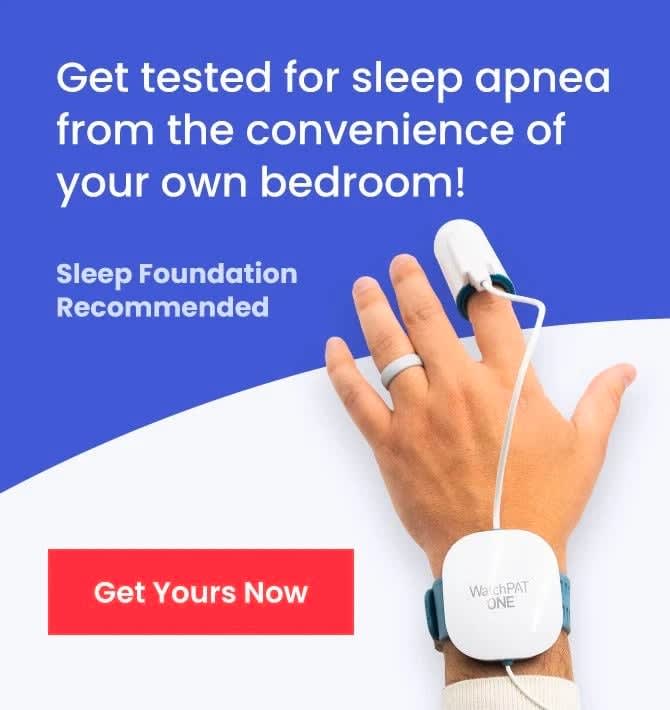When you buy through our links, we may earn a commission. Products or services may be offered by an affiliated entity. Learn more.
Best CPAP Masks for Side Sleepers in 2026
Finding the right CPAP mask can make a world of difference when it comes to comfort, especially if you’re a side sleeper. Not all masks are designed to stay in place—or feel good—when your face is pressed against a pillow. Side sleeping poses unique challenges, from potential air leaks to pressure points and shifting straps. In this guide, we’ll highlight the best CPAP masks for side sleepers, including designs that prioritize a secure fit, minimal bulk, and a more restful night’s sleep.
Our Top Picks
- Best Value – Rio II Nasal Pillow CPAP Mask
View Details
Swipe for more
Best Overall
ResMed AirFit P30i Nasal Pillow Mask with Headgear
Use this link for the most current ResMed discount
Use this link for the most current ResMed discount
A lightweight design, top-of-head tubing, and close fit make the ResMed AirFit P30i Nasal Pillow Mask with Headgear an excellent option for many sleepers with CPAP machines. You shouldn’t experience movement restrictions throughout the night, and you can’t beat the competitive price point.
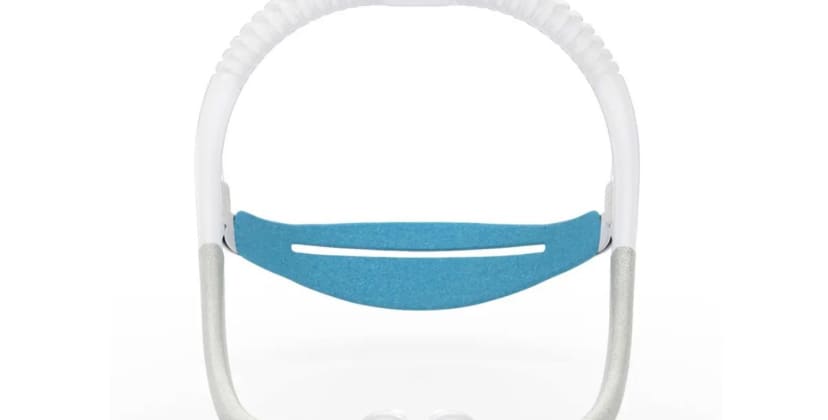
Price
$85
Full Details
Nightlong comfort is key for CPAP users. If a mask feels too bulky or constrictive, this can interfere with healthy sleep and essentially undo the benefits of CPAP therapy. The AirFit P30i Nasal Pillow Mask from ResMed is designed with sleeper comfort in mind, including top-of-head tubing and joints for additional freedom of movement.
What Does It Do?
The headgear has a slender profile that rests along the sides of your head to minimize uncomfortable tightness or pinching. Small ridges along the frame are designed to follow the contours of your face. A tubing connection located at the top of the head allows the wearer to change sleep positions easily.
Who It’s Best For
Thanks to the strategically placed tubing and the close-fitting frame, the mask won’t obstruct your vision. This allows you to watch TV or read before bed without restriction. Designed for universal compatibility, you should be able to use any nasal pillow or nasal cushion with the mask. Each purchase includes small, medium, and large pillows to help you narrow down the most comfortable option.
The ResMed AirFit P30i Nasal Pillow Mask is affordably priced, and The CPAP Shop offers free ground shipping for all orders of $99 or more. Customers also receive a 30-night mask trial with their purchase.
Best Value
Rio II Nasal Pillow CPAP Mask
Use this link for the most current React Health discount
Use this link for the most current React Health discount
Customizable CPAP masks often come at a higher price-point, but the Rio II Nasal Pillow CPAP Mask is a notable exception. Multiple adjustable straps and joints help the mask feel comfortable throughout the night.
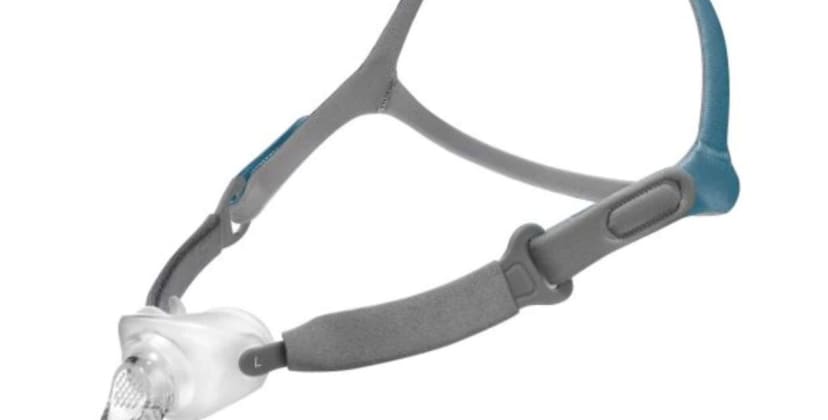
Price
$72
Full Details
The Rio II from React Health — formerly 3B Medical — is a highly customizable nasal pillow CPAP mask with an approachable price-point. The adjustable design makes it perfect for combination sleepers who feel restricted in other masks.
What Does It Do?
A split back strap allows you to tighten and loosen the headgear to your preference, while an adjustable pillow reservoir ensures optimal comfort. The ball-and-socket elbow design lets the mask adjust to your head while you sleep, even if you tend to toss and turn at night. Since it lacks a forehead strap, you can freely watch television or read without the mask obstructing your line of sight.
Who It’s Best For
The automatically adjusting design makes the Rio II a great choice if you tend to switch from sleeping on your side to your back. The mask comes in an all-sizes kit to help you find the nasal pillow that fits you best. The lightweight design weighs just 2.4 ounces, making it a solid choice if you travel frequently.
The Sleep Doctor offers a trial period, during which you can return the mask unused within 30 days of delivery. If you decide to return the mask, you receive a full refund minus a 15% restocking fee.
Most Comfortable
Philips Respironics DreamWear Nasal Pillow CPAP Mask with Headgear
Use this link for the most current Philips Respironics discount
Use this link for the most current Philips Respironics discount
The Philips Respironics DreamWear Nasal Pillow CPAP Mask with Headgear has thoughtful features that keep you comfortable throughout the night. Top-of-head tubing and soft materials ensure you can read or watch TV without irritation or obstructed field of vision.
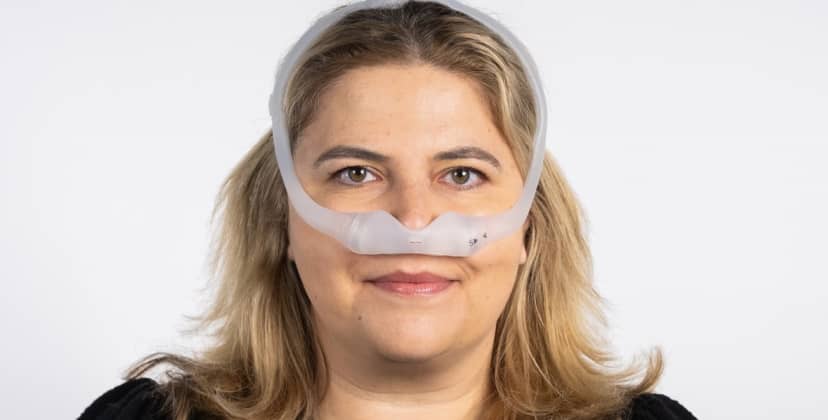
Price
$109
Full Details
Many CPAP masks can irritate the face and restrict movement throughout the night, but the DreamWear Nasal Pillow CPAP Mask is designed with comfort in mind. Top-of-head tubing, comfortable nasal ports, and soft materials make the mask comfortable and unrestrictive.
What Does It Do?
The hose is strategically placed at the top of your head, so the mask won’t obstruct your sight or interfere with nightly movements. Nasal ports rest under the nose, preventing irritation on the bridge of your nose. Air enters the hose at the top, then travels through the mask and into the nasal ports. Made from silicone, the cushions and frame are designed to feel soft on your skin and should not cause red marks.
Who It’s Best For
The mask is a great choice if you experience irritation with other models. The tubing placement ensures your line of sight isn’t obstructed, so you can comfortably watch TV or read before bed. You can choose between three pillow sizes: small, medium, and large. A fit pack is available if you are unsure of the size you need.
The Sleep Doctor offers a subscription option that will regularly ship new masks to you, and you’ll save 5% at checkout. The DreamWear Nasal Pillow CPAP Mask is backed by a 2-year warranty.
Best for New CPAP Users
ResMed AirFit P10 Nasal Pillow CPAP Mask
Use this link for the most current ResMed discount
Use this link for the most current ResMed discount
Many new CPAP users can struggle with the treatment’s noise level and uncomfortable feel. The ResMed AirFit P10 Nasal Pillow CPAP Mask combats this issue with quiet mesh-vent technology and a lightweight design.
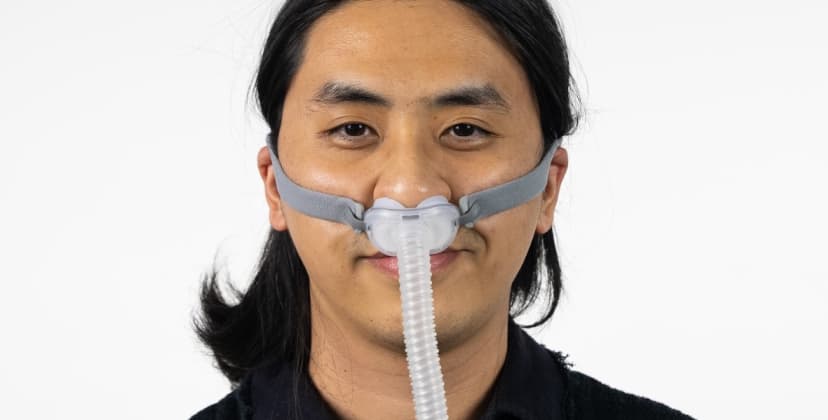
Price
$99
Full Details
The ResMed AirFit P10 Nasal Pillow CPAP Mask features a quiet and lightweight design that is approachable for new CPAP users, as well as an accessible price-point. The mask is also very versatile and is compatible with all CPAP, BiPAP, and VPAP machines.
What Does It Do?
The ResMed AirFit P10 doesn’t cover your nose, as it inserts partially into your nostrils via two prongs. The low-profile ResMed AirFit P10 features a dual-wall construction to help enforce an airtight seal. With its color-coded, clip-on construction, the cushions are easy to assemble and remove. The mask also has a short, flexible tube, which adjusts to your nightly movements without getting tangled.
Who It’s Best For
Because this model has minimal facial contact, you’re less likely to encounter skin irritation. Thanks to mesh-vent technology, the ResMed AirFit P10 is also exceptionally quiet, so it may be well-suited for sleepers who are easily disturbed by noise. Side sleepers should also enjoy the airtight design to prevent leaks, which are common for people with CPAP machines who use this position.
The ResMed AirFit P10 comes with three sets of small, medium, and large size cushions, headgear, a short tube, a mask frame, and two headgear clips. The mask is backed by a 2-year warranty and can be returned within 30 days of purchase.
Best Fit
Philips Respironics DreamWear Full Face CPAP Mask Fit Pack
Use this link for the most current Philips Respironics discount
Use this link for the most current Philips Respironics discount
Having the correct-fitting CPAP mask for your face is crucial to feeling comfortable during nightly treatment. The Philips Respironics Dreamwear Full Face CPAP Mask Fit-pack comes in four sizes that should fit most face types.
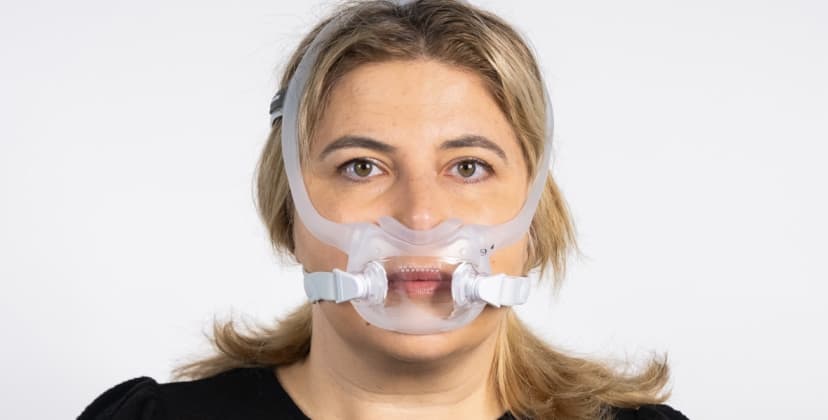
Price
$169
Full Details
The DreamWear Full Face CPAP Mask is a popular model for its low profile design and variety of size options. The Fit-pack comes with one of each of the four sizes – small, medium, large, and medium wide – so you can find the fit that best suits your face.
What Does It Do?
The mask seals under your nose and lower lip, forming a seal to prevent air from escaping. The pack comes with both nasal pillows and under-the-nose cushions. Tubing at the top of your head makes it easy to switch sleeping positions. The standard tubing is compatible with most CPAP machines on the market.
Who It’s Best For
The open-frame design does not make contact with your nose bridge, making it a great choice if you typically get red marks or irritation from other masks. The choice between nasal pillows and cushions is beneficial for new CPAP users who are unsure of their preferences. The unobstructive tubing also keeps your line of sight clear while watching TV or reading before bed.
The Sleep Doctor ships free on all orders of $99 or more, provided you live in the contiguous U.S. This policy covers the DreamWear Full Face CPAP Mask Fit-pack. Purchases come with a 2-year warranty and 30-day return period.
Best Overall
ResMed AirFit P30i Nasal Pillow Mask with Headgear
Use this link for the most current ResMed discount
Shop at Sleep DoctorA low-profile nasal pillow mask with top-of-head tubing and a flexible frame that allows for easy movement and an unobstructed view.
See More Details
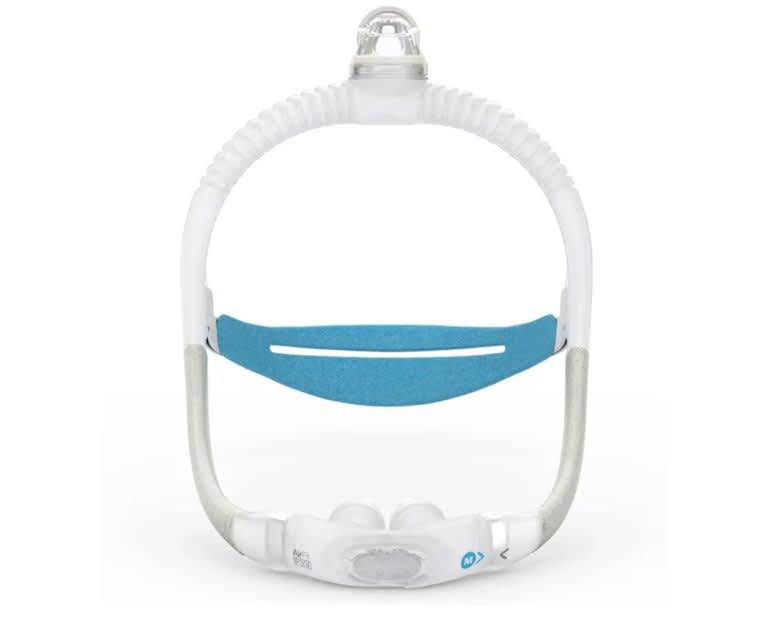
Best Value
Rio II Nasal Pillow CPAP Mask
Use this link for the most current React Health discount
Shop at Sleep DoctorA lightweight, travel-friendly nasal pillow mask with adjustable headgear and a flexible ball-and-socket design that moves with you.
See More Details

Most Comfortable
Philips Respironics DreamWear Nasal Pillow CPAP Mask with Headgear
Use this link for the most current Philips Respironics discount
Shop at Sleep DoctorA soft, low-profile nasal pillow mask with top-of-head tubing and under-the-nose cushions designed to reduce facial irritation and allow for a full range of nighttime movement.
See More Details

Best for New CPAP Users
ResMed AirFit P10 Nasal Pillow CPAP Mask
Use this link for the most current ResMed discount
Shop at Sleep DoctorAn ultra-quiet, lightweight nasal pillow mask with minimal facial contact, dual-wall cushions for a secure seal, and a flexible short tube that moves with you.
See More Details

Best Fit
Philips Respironics DreamWear Full Face CPAP Mask Fit Pack
Use this link for the most current Philips Respironics discount
Shop at Sleep DoctorA low-profile full face CPAP mask with top-of-head tubing, under-the-nose sealing, and multiple sizing options.
See More Details

How to Choose a CPAP Mask for Side Sleepers
One of the main challenges for side sleepers using CPAP therapy is simply keeping the mask in place. Your pillow can displace the mask, or if it’s causing discomfort, you may unknowingly move it during the night. The best CPAP mask will be sturdy enough to fit securely and withstand pressure changes, yet soft enough to limit facial discomfort. Pressure soreness during therapy is a common problem for side sleepers, but finding a mask with soft buckles and surfaces can minimize this.
Side sleepers are also more prone to air leakage because of the way the face rests against a pillow, but an ill-fitting mask combined with restlessness can negatively impact CPAP therapy. Air leaking from a weak seal around your nose or mouth reduces the efficacy of your mask, so it’s essential to find a mask that fits both comfortably and securely and won’t hinder your CPAP therapy.
Finding the right fit will depend on several variables. It’s always a good idea to consult with your doctor before purchasing a CPAP mask, since medical professionals may be able to make recommendations based on your health profile. Size, fit, comfort, durability, and machine compatibility are some of the most important factors to examine when shopping for a CPAP mask, as they can greatly impact the success of your therapy.
- Doctor’s Recommendations: Your doctor can often make CPAP mask recommendations based on your personal history and sleep style. You can also request to be fitted for a mask at a doctor’s office or sleep clinic, which is helpful since masks are often not returnable once opened.
- Size & Fit: Finding the right size and fit might require some experimentation, but it’s well worth the effort since an ill-fitting mask can undermine your CPAP therapy. Each type of mask fits differently, and its comfort and security will largely depend on your sleep position and face shape. Side sleepers typically do well with a low-profile, minimal design that doesn’t obstruct your face’s contact with a pillow. For this reason, side sleepers often prefer nasal pillows, as they fit under the nose instead of over and are the least invasive mask type. Cushions, which are used to seal your CPAP mask system, typically come in small, medium, and large sizes. The right size cushion is critical, as this helps prevent air leaks. A proper fitting cushion will be snug yet comfortable, and its opening will fall directly below the nostrils.
- Contact Points: Side sleepers typically do best with minimal designs like nasal pillows, as they have fewer points of contact with the face. Less mask surface area means lower friction and pressure between the face and pillow, thereby reducing the risk of air leaks.
- Comfort: Many people who experience sleep apnea give up on CPAP therapy because they find the masks too cumbersome or uncomfortable. Side sleepers often complain that full-face masks are too bulky and dig in uncomfortably. Finding headgear and cushions that fit securely yet noninvasively will increase your therapy’s efficacy as well as its consistency.
- Compatibility: It’s important to verify that your new mask is compatible with your CPAP machine. Even if the model uses standard CPAP tubing, it’s a good idea to double-check the manufacturer’s manual for compatibility guidelines.
- Tube Location: A CPAP tube or hose is a hollow plastic cylinder that connects the mask to your CPAP device. The tube will have a swivel connection at the mask’s nasal area or at the top of your head. Tube placement relative to sleep position is an important factor since a tangled tube is more likely to cause air leaks. Combination sleepers typically do well with masks that have top-of-head tubing, which tends to stay out of the way when changing positions. Side sleepers often have success with nasal tubing because it doesn’t encroach on the pillow as much.
- Included Components: Parts vary based on the model type, but CPAP masks commonly include cushions, headgear, tubing, clips, mask frames, and soft cloths.
- Materials: It’s important to consider the materials that go into a mask, especially when it comes to comfort and possible allergies. Skin irritation is a common complaint of those using CPAP therapy, but many masks utilize soft materials like fleece or cotton to minimize aggravation. Other common mask materials include silicone, rubber, foam, and vinyl.
- Durability: Masks don’t have the same longevity as CPAP machines, but properly caring for the components will extend their life and efficacy. It’s a good idea to regularly inspect parts for wear, but as a general rule of thumb, cushions should be replaced every month, while the mask frame and tubing are best changed out every 3 months. The headgear and chin strap will often last as long as 6 months.
- Price: Cost varies based on quality, style, and materials, but the average CPAP mask ranges from $50 to $150.
- Warranty: The average warranty for a CPAP mask is 90 days, which covers potential manufacturing defects. Some policies will replace your mask right away if a defect arises within the policy window, while other manufacturers require that you return the mask for inspection before they send a new one.
What Types of CPAP Masks Are Best for Side Sleeping?
Finding a compatible CPAP mask comes down to multiple variables, but sleep position is one of the most important factors. Side sleepers are especially prone to air leaks, skin irritation, and general discomfort, which is why certain models are more appropriate than others. Minimal, low-profile designs, like nasal pillows, are usually better choices for side sleepers because they tend to cause less friction than full-face masks.
With that said, it’s always wise to discuss mask styles with your medical provider since they may be able to provide personalized recommendations based on your health and circumstances.
| CPAP Mask Type | Description |
|---|---|
| Nasal Masks | This common option consists of a triangular-shaped mask that covers the nose from the bridge to the upper lip area. The mask is often reinforced by an additional forehead strap that rests above the eyebrows. Nasal masks are a good choice for many side sleepers because they are less bulky than full-face models and shouldn’t dig into the skin as much. Regardless of your sleeping position, the nasal mask isn’t the best option for those who wear glasses or have facial hair, as this can interfere with the seal. |
| Nasal Pillow Masks | This is one of the most popular mask types for side sleepers because it has the lowest profile and is the least invasive. The mask consists of a cushion with a seal that is partially inserted into the nostrils and held in place by straps and headgear. A nasal pillow mask should be lightweight, and because there is minimal contact with the face, side sleepers are less likely to encounter pressure or skin irritation. Active side sleepers may find that this style is also more likely to stay in place. Nasal pillow masks are often ideal for people with narrow nose bridges, smaller faces, and/or facial hair. |
| Full-Face Masks | The most sizable of the three mask varieties, a full-face mask consists of a sturdy plastic frame covering the mouth and nose, which is held in place by straps and headgear. It is typically too large and bulky to be comfortable for most side sleepers, and because it requires a large seal, it is more likely to leak. This style is recommended for people who breathe through their mouths or require higher pressures. |
Which CPAP Mask Is Best For You?
If you sleep on your side, it’s important to pick a CPAP mask that will stay put through the night. In the video below, we explore the different types of CPAP masks available on the market and which are best suited for side sleepers.
Helpful Tips for Side Sleepers With Sleep Apnea
While finding the right mask can greatly improve your CPAP therapy, side sleepers can take additional steps to enhance overall performance and sleep quality.
Clean CPAP Components Frequently: Regular cleaning is one of the most crucial factors in optimizing CPAP therapy, preventing infections and illness, and extending the life of your equipment. When oils and skin cells collect on the mask, they can interfere with a snug fit.
Your mask, headgear, and tubing can be washed by hand in warm soapy water and then air-dried completely before use. It’s best to clean the tubing and headgear at least weekly, while the cushion should be washed daily. It’s also advisable to wash the equipment more frequently when you’re sick.
Replace Worn Mask Components: It’s good practice to inspect your mask parts routinely because worn components can greatly reduce CPAP performance. Cushions and/or nasal pillows should be replaced every month, while the frame and tubing should be exchanged every three months. Headgear typically lasts as long as six months.
Consider a CPAP Pillow: These are special pillows designed for CPAP therapy with cutouts to accommodate your mask and hose. This design allows sleepers to move freely at night without as much worry of compromising their seal and causing leaks. A CPAP pillow can also alleviate pressure points and make your therapy much more comfortable.
“Side sleepers tend to need a high-loft pillow for support and to fill the space beneath the head and neck to promote proper spinal alignment. Keep your head and neck in alignment at around 30 degrees with the help of a good pillow so your airway stays open during the night, allowing air to flow from your nose to your lungs without obstruction.”
– Sarah Silverman, Psy.D., a licensed psychologist and holistic sleep wellness consultant who treats patients in New York and Florida.
Consider a CPAP Chinstrap: Side sleepers who breathe through their mouths or chronically awake in the morning with a dry throat may benefit from a CPAP chinstrap. Mouth breathing can be a significant impediment, as it reduces the air pressure needed for optimal CPAP therapy. A chinstrap can reduce this tendency by using a padded chin cup and headgear to help the jaw stay closed throughout the night.
Other CPAP Mask Guides
If you’d like to explore more options, check out our team’s hand-picked selections for specific types of CPAP masks.
Frequently Asked Questions
Do full-face CPAP masks work for side sleepers?
Even though full-face masks aren't typically recommended for side sleepers, certain styles can work as long as they fit securely and/or have certain attributes to accommodate this position. For example, full-face masks with hoses on the top of the head can be effective because they are less likely to become obstructed and cause leaks. Models that target active sleepers will often be more suitable for side sleepers, as they might have extra features to help keep the mask in place.
Are CPAP masks covered by insurance?
CPAP masks are often covered by insurance because they are classified as durable medical equipment, but it's always a good idea to check eligibility with your provider.
Do I need a prescription for a CPAP mask?
A CPAP mask is deemed a Class II medical device by the FDA and therefore requires a prescription to purchase. Certain individual mask parts, however, may be purchased online without a prescription.

Still have questions? Ask our community!
Join our Sleep Care Community — a trusted hub of product specialists, sleep health professionals, and people just like you. Whether you’re searching for the perfect mattress or need expert sleep advice, we’ve got you covered. Get personalized guidance from the experts who know sleep best.



